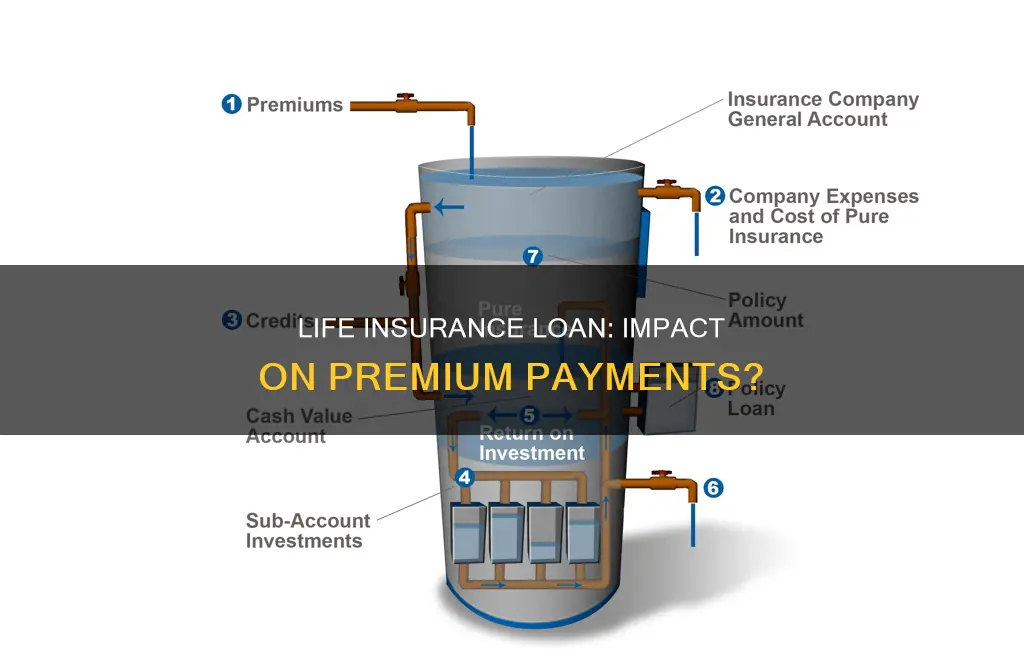
Life insurance policies can be used as collateral to take out loans, which can be useful in emergency situations. However, it is important to understand the implications for policy benefits and premiums. The loan amount is generally a percentage of the policy's cash value, and if the loan is not repaid before the insured person's death, the loan amount and interest will be subtracted from the death benefit. This will reduce the amount received by the beneficiaries and could impact the premium.
Does taking a loan against life insurance impact premium?
| Characteristics | Values |
|---|---|
| Interest | Yes, interest is charged on the loan balance. |
| Repayment | No fixed repayment schedule. |
| Death benefit | The loan amount and interest are deducted from the death benefit. |
| Tax | Tax-free unless the policy lapses or is surrendered before the insured's death. |
| Credit score | No credit score check required. |
| Premium | Taking a loan may deplete the amount required to guarantee the premium. |
| Maximum loan amount | Up to 90% of the policy's cash value or surrender value. |
| Ease of access | Quick and easy access to funds. |
What You'll Learn

Borrowing against life insurance is quick and easy
Borrowing against life insurance is a quick and easy way to get access to cash. Life insurance loans are available on permanent life insurance policies, such as whole life and universal life, that have a cash value component.
The process of borrowing against life insurance is straightforward. You simply fill out a form, and the insurance company will send you the money within a couple of days. There is no loan approval process, credit check, or income verification required, and you can use the loan funds for whatever you choose. The policy's cash value acts as collateral for the loan, and the loan amount can be up to 90% of the policy's cash value.
Another advantage of borrowing against life insurance is that there is no set repayment schedule. You can pay back the loan at your own pace, and there are no required monthly payments. However, it's important to note that the loan will accumulate interest over time, so the balance will increase if you don't make payments.
While borrowing against life insurance can be a convenient option for quick access to cash, it's important to consider the potential risks. If the loan is not repaid before the insured person's death, the loan amount plus any interest owed will be deducted from the death benefit paid to the beneficiaries. Additionally, unpaid loans may affect the policy's guarantees and could result in additional costs or a lapse in the policy.

Interest rates are lower than personal loans
Interest rates for loans taken against life insurance policies are typically lower than those for personal loans. Life insurance loans are usually between 5 and 8%, whereas personal loans tend to have higher interest rates. Life insurance loans are also not taxed as income.
The interest rate for a life insurance loan is set by the insurer, and there are no fixed repayment terms. However, it is a good idea to repay the loan to avoid accruing interest. If the loan is not repaid, the interest can increase to the point where it reduces the death benefit or causes the policy to lapse.
When you take out a loan against your life insurance policy, the policy's cash value acts as collateral. This means that the policy's cash value can continue to accumulate, but it is important to check with your insurance company how interest and any dividends will be determined and paid while you have an active loan.
Most whole life insurance loans do not have to be paid back on a specific timetable. However, setting a personal repayment schedule can help ensure that the loan is repaid without accruing significant interest. The interest rate will be fixed or variable, depending on the policy.
While life insurance loans offer quick and easy access to funds, it is important to carefully consider the potential risks and downsides before taking out such a loan. Consulting a financial professional can help individuals determine if borrowing against their life insurance is a suitable choice for their situation.

No credit checks or income verification required
Borrowing from your life insurance policy is a quick and easy way to access funds. Unlike a bank loan or credit card, there is no approval process, credit check, or income verification. This is because you are borrowing against your own assets. Policy loans are not considered taxable income, and you can borrow up to 90% of your cash value.
There are several benefits to taking out a loan against your life insurance policy. Firstly, there are no credit checks or income verification requirements, making it an accessible option for those who may not meet traditional loan requirements. Secondly, policy loans generally have lower interest rates than bank loans and do not charge high fees or closing costs. In most cases, they are also tax-free. Additionally, there is no required monthly payment or payback date, and you can use the loan funds for whatever you choose.
However, it is important to consider the potential drawbacks of borrowing against your life insurance policy. The loan amount is typically limited to a percentage of your cash value, which may be less than you need. If you do not repay the loan, you could owe taxes or face a lowered death benefit. The interest will continue to accrue until the loan is paid off, and if the loan balance exceeds the available cash value, the policy may lapse, resulting in the cancellation of coverage for your beneficiaries.
Before taking out a loan against your life insurance policy, it is essential to weigh the pros and cons to make an informed decision. Understand how the loan could impact your policy and the future payout for your beneficiaries. Request an in-force illustration from your insurance company to outline the potential consequences of the loan.

No repayment schedule
Borrowing against your life insurance policy can be a quick and easy way to access funds. Unlike a bank loan, there is no application, credit check, or approval process, and no fixed repayment schedule. The money can be used for any purpose, and you can choose to repay the loan on a schedule that works for you.
However, it's important to understand the potential risks of borrowing against your life insurance policy. While repayment is flexible, interest will continue to accrue, and the death benefit of the policy will be reduced by the amount of the loan and interest if it is not repaid. Additionally, if the loan balance and interest exceed the cash value of the policy, the insurance company may cancel the policy, leaving you without coverage. There may also be adverse tax consequences if the policy lapses or is surrendered before the insured's death.
To avoid these risks, it's essential to carefully consider your financial situation and seek advice from a financial advisor before taking out a loan against your life insurance policy. While it can provide quick access to funds, it's important to understand the potential long-term implications and make informed decisions about your financial options.
In summary, borrowing against your life insurance policy can offer flexible repayment options and quick access to funds, but it's crucial to weigh the risks and ensure you understand the potential impact on your coverage and benefits. Consulting a financial advisor can help you make an informed decision that aligns with your financial goals and needs.

Death benefits will be reduced if the loan isn't repaid
Borrowing against your life insurance can be a quick and easy way to access cash. However, it is important to understand the risks involved. If you take out a loan against your life insurance policy and do not repay it before your death, the loan amount, plus any interest owed, will be subtracted from the death benefit paid out to your beneficiaries. This could significantly impact the amount they receive.
When you take out a loan against your life insurance policy, the policy's cash value acts as collateral. This means that the policy's cash value can continue to accumulate, but the loan and interest will need to be repaid to avoid reducing the death benefit. While there is no requirement to repay the loan, and the funds can be used for any purpose, the longer the loan is left unpaid, the more interest will accrue, increasing the amount that will be subtracted from the death benefit.
The reduction in the death benefit could put the policy at risk of not providing sufficient money, or any money at all, to beneficiaries. This is a significant risk to consider when taking out a loan against your life insurance policy. It is important to weigh the pros and cons of all options before making a decision. Consulting a financial advisor can help you understand the potential impact on your policy and beneficiaries.
In some cases, if the loan amount and interest exceed the cash value of the policy, the policy could lapse, and the entire loan amount could become taxable. This would further reduce the death benefit and impact the amount received by beneficiaries. Therefore, it is crucial to carefully consider the potential risks and long-term implications of taking out a loan against your life insurance policy.
Frequently asked questions
Yes, you can take a loan against your life insurance policy. However, not all life insurance policies provide this option. You can typically get a loan against traditional life insurance policies, such as endowment and money-back policies.
The maximum loan amount depends on the type of life insurance policy and its surrender amount. The loan amount is generally a percentage of the policy's surrender value. The loan amount can go as far as 80-90% of the surrender value in the case of endowment or money-back plans.
There are several benefits to taking a loan against your life insurance policy:
- Quick and easy access to cash
- No credit check or income verification required
- Lower interest rates compared to bank loans or credit cards
- No restrictions on how you can spend the money
- No set repayment schedule
While taking a loan against your life insurance policy can provide quick access to cash, there are also some risks to consider:
- Unpaid loans may reduce the death benefit or result in the loss of the policy
- Interest accrues on the loan balance, increasing the total amount owed over time
- If the loan amount gets too high, the insurance company may surrender your policy to pay off the loan
- You may owe taxes if the policy lapses or is surrendered before the insured's death







